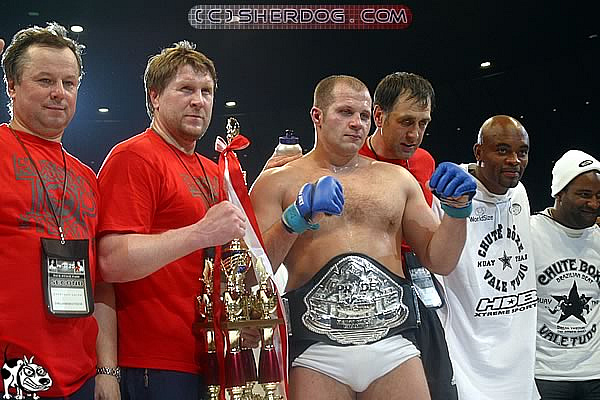One Man’s View: Fedor Not the Best Ever

Who
is the greatest of all time: Fedor Emelianenko (center) or Anderson
Silva (second from right)? Tell us below.
Now that it has become stone-cold clear that Fedor Emelianenko’s time as a top heavyweight is irrevocably over, the next questions emerge: how does one assess his legacy and where does it stand in the context of the sport’s all-time greats?
You could make the argument that Emelianenko was the most accomplished mixed martial artist ever. During his run from 2001 to 2009, which included a 28-fight unbeaten streak, he put together a nine-year swath of dominance that is unlikely to be challenged, unless UFC middleweight champion Anderson Silva stays unbeaten in the Octagon for the next two to three years.
Advertisement
In the same way that Wilt Chamberlain’s 50.4 points a game in 1961-62 defines him as the greatest single-season scorer in history, the context in which he achieved this cannot be overlooked. Chamberlain was not facing competition comparable to the level of current players in the NBA, which is what makes his record all but unassailable today.
Cain
Velasquez File Photo
Who wins: Fedor in his prime, or Cain?
Fedor dominated and decimated the best of the Pride Fighting Championships big men and ran roughshod in a slew of non-title bouts against opponents that were of the precise quality one would expect in a non-title foe. He created an aura of menace and consistent intensity that in many ways defined the sport’s standard of what a champion should be. However, today’s UFC matchmaking model has little resemblance to the one that procured Fedor’s challengers in Japan; the best contender is consistently put forth for Silva, Georges St. Pierre and Velasquez, who, in his first defense of the UFC
heavyweight crown, will take on the dangerous “Cigano.”
Another idea to consider: Fedor competed across two eras, where a comparison of the best of both reveals a considerable talent gap. The sport’s athletes have improved markedly since the mid-2000s, so much so that in watching events from five-plus years ago it seems at times a different sport, given the limited skill sets glaringly on display. Given the insane parity and dangerous power virtually every heavyweight at the top of the game today possesses, no heavyweight is putting together a ten-fight unbeaten streak as champ, much less 28.
Other thoughts to consider were explored in my piece “Chasing Fedor,” written after the fallout of the UFC’s final and failed attempt to sign Fedor in the summer of 2009. In it, I delved into the UFC’s decision not to sign Fedor given M-1 Global’s stiff demands -- a decision based on the premise that one fighter is not worth the price that was asked for Fedor, given the time and leverage the UFC had in building other attractions. The UFC took a lot of grief for not closing the deal among some fans and industry watchers, but does it look like anything but a prescient decision now?
The UFC did precisely the opposite, developing what is now a robust heavyweight division; imagine if it had offered up the unprecedented money and co-promotional rights for which Fedor’s team asked and he had performed as poorly in the UFC as he has in his last three bouts. That would have been a complete bomb of a deal for everyone involved, except, of course, for M-1 Global.
With that said, the man and the management/promotional people around him should be separated in terms of analyzing the scope of his career. Emelianenko has carried himself as a humble, eminently likeable champion, one who has supplied fans with moments of incredible drama. Even in his defeats to Antonio Silva and Dan Henderson, there was a sense that he had emerged unbowed, if badly banged-up.
Whether it was being retired on his stool with a battered-shut eye against “Bigfoot” Silva after two rounds or still rolling over against Henderson after being smashed unconscious for a brief moment, Fedor always left you with the sense that he had not been completely broken, that he would keep fighting until absolutely snuffed from consciousness. I hope his career ends here with some semblance of that magic intact and no real-world demonstration of what it would look like.
The argument against Fedor being the best ever will pick up steam over the next two to three years. The UFC now has the best lineup of champions in recent memory, and Silva is well on his way to already beating a better overall group of opponents than Fedor did. Emelianenko’s run was amazing and will likely never be matched, but the game’s a different animal these days, something even the most hardcore defenders of his legacy are finding out.
Jason Probst can be reached at Jason@jasonprobst.com or twitter.com/jasonprobst.
Related Articles







